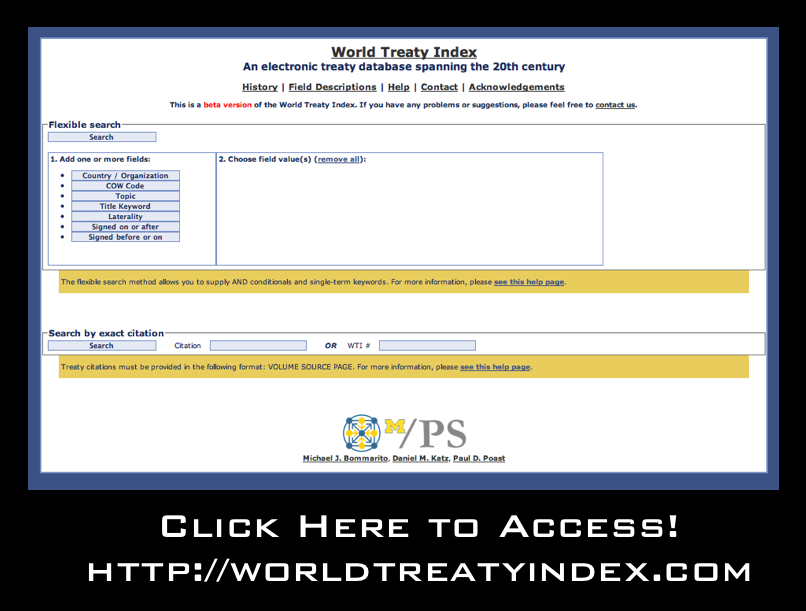What is the World Treaty Index?
The World Treaty Index (WTI), originally compiled by Peter Rohn in the 1960s and 1970s and subsequently maintained and updated at the University of Washington, is a comprehensive list of all known treaties formed during the twentieth century. This includes not only treaties formally registered with the United Nations (UNTS) but a significant number of unregistered agreements.
What information does the World Treaty Index provide?
The WTI provides information on the parties to the agreement, the general topic of the agreement (e.g. trade agreement, tax agreement, an arms control agreement, etc.), as well as the signing date and the date in force, and the volume and page containing the text of the agreement. Though the WTI does not provide the full text of each agreement, it is an excellent resource for identifying when a state (or states) formed a number of international agreements of a particular type. With a list of relevant agreements (including their volume and page number), an end user interested in obtaining the full text can simply collect them using the primary source material (i.e. UNTS, LTS, etc.)
Who is currently administrating the World Treaty Index?
The Electronic WTI is now housed at the University of Michigan and administrated by Michael Bommarito, Daniel Martin Katz and Paul Poast. We are highlighting the newly constructedBeta Prerelease of the WTI website in an effort to obtain feedback prior to the official release. The currently available product provides access to information on more than 58,000bilateral and multilateral treaties formed between 1900 and 1997. When full coverage for the 20th century is complete, the database should feature in excess of 70,000 agreements.
What are some examples of searches I can conduct on the World Treaty Index website?
While the WTI should support all browsers, we suggest using Firefox. Below are three sample searches.
Search #1: Suppose a user would like to collect all agreements involving Brazil. Use the “flexible search” and follow three easy steps. (A) Select the country/organization field (B) within the country/organization field set the field value = Brazil (C) click the search button.
Search #2: Suppose a user would like to collect all agreements between Mexico and Spain. Use the “flexible search” and follow five easy steps. (A) Select the country/organization field (B) within the country/organization field set the field value = Mexico (C) Select a second country/organization field (B) within this new country/organization field set the field value = Spain (E) now click the search button.
Search #3: Suppose a user would like to know how many extradition agreements France signed between 1950 and 1962. This is similar to the examples above but involves the topic, signed on or after and signed before or on fields. After the user chooses the proper search fields and selects the search information, the WTI will produce on the screen a list of the desired agreements and provide the option of downloading the list as a CSV file.
When will it feature full coverage for the entire 20th Century?
By the end of 2010, we will add (1) all bilateral treaties formed between 1900 and 1944 [Now Mostly Done] (2) all bilateral treaties formed between 1998 and 1999, and (3) all multilateral agreements and a list of all parties to each multilateral agreement. If you know of an agreement that is not ultimately featured on the site please contact us and we will be happy to add it to the list.
How can I learn more about the World Treaty Index?
For a general history of the World Treaty Index, visit the “History Page” on the worldtreatyindex.com website. For a more detailed treatment please see: Glenda Pearson, Rohn’s World Treaty Index: Its Past and Future, 29 International Journal of Legal Information 543 (2001).
What additional extensions of the Electronic World Treaty Index are planned?
As noted above, our initial goal is provide complete coverage of all known agreements in the 20th Century. Planned extensions include bringing the World Treaty forward so as to provide coverage up to 2010. In addition, we plan to collect information regarding treaty terminations. Finally, we would like to enhance the granularity of our topic codes and allow for agreements with multiple dimensions to feature multiple topic codes.
Feedback?
At this point, we have only offered a beta pre-release of the site. Thus, we would really appreciate your feedback, etc. Please email us at worldtreatyindex@gmail.com if you have any thoughts about how to improve the site.

